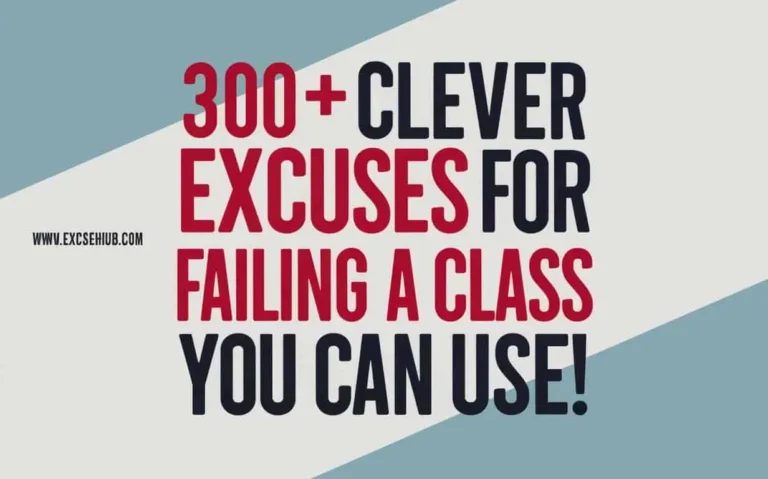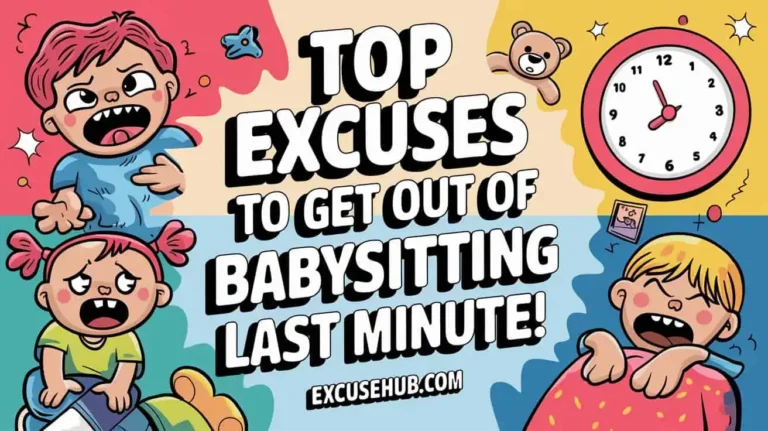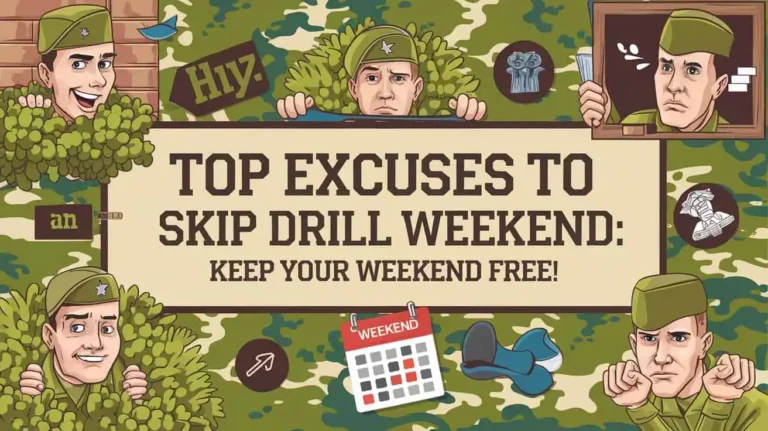How to Make a Good Excuse: Tips for Crafting Perfect Reasons
To make a good excuse, choose something believable and specific. Traffic jams and family emergencies resonate well, while vague excuses often fall flat. Keep it concise—avoid over-explaining, which can sound insincere.
It’s important to maintain a calm tone and make eye contact if you’re speaking in person, as this builds trust. Personalize your message to fit the recipient and the situation.
If you can propose a solution or express a desire to reconnect, that enhances your sincerity. Want to discover more effective techniques for crafting your excuse? There’s plenty more to uncover!
Top 10 Most Believable Excuses for Tardiness
When you find yourself running late, a believable excuse can make all the difference. It’s crucial to take into account cultural differences and workplace expectations when crafting your excuse.
Here are ten excuses that are generally accepted across various environments.
- Traffic Jam: It’s a classic, but verify it’s plausible for your area.
- Family Emergency: A last-minute situation can earn you sympathy.
- Public Transport Delay: If you rely on transit, this is a reasonable option.
- Health Issues: Mentioning a sudden headache or stomach bug can resonate.
- Appointment Overrun: Doctors and other appointments can be unpredictable.
- Childcare Issues: Parents can relate to unexpected school-related obligations.
- Home Emergency: A burst pipe or power outage can be convincing.
- Car Trouble: Mechanical issues can happen to anyone.
- Weather Conditions: Severe weather can delay anyone’s commute.
- Miscommunication: A simple mix-up in your schedule can sound credible.
Make certain to be genuine and avoid exaggeration. Keeping it simple and relatable can help you navigate workplace expectations while respecting cultural differences in how excuses are perceived.
Common Excuses for Missing Work
Sometimes, despite your best efforts, you just can’t make it to work. Life happens, and you might find yourself needing to provide an excuse. Common reasons for missing work include family emergencies. Whether it’s a relative in distress or unexpected events, these situations demand your attention.
Medical appointments are another valid cause; everyone needs to prioritize their health sometimes. You might also have personal obligations that you can’t put off, like attending an important event or handling urgent matters.
Childcare issues can arise unexpectedly, leaving you scrambling for solutions. If your child’s school calls because they’re sick, you’ll need to act quickly. Home repairs can disrupt your plans, especially if a pipe bursts or your heating fails.
Similarly, transportation problems like a flat tire or car trouble can derail your day. Finally, don’t underestimate the importance of mental health. If you’re feeling overwhelmed, it’s essential to take time off to recharge.
Weather conditions can also prevent you from commuting safely, especially during storms or severe weather. In all these situations, honesty is key. Keep your excuses straightforward and genuine to maintain trust with your employer.
Creative and Unique Excuses for Pets
Pets can throw a wrench in your plans, and having a creative excuse ready can save the day. You never know when your furry friend will create an imaginative pet mishap that leaves you scrambling for a rational explanation. Here are some unique excuses to use in various pet sitting scenarios:
| Scenario | Excuse | Bonus Tip |
|---|---|---|
| Dog ate your homework | “My dog mistook it for a chew toy!” | Show a “chewed” notebook. |
| Cat knocked over a vase | “My cat was trying to reenact a movie scene!” | Share a funny video. |
| Pet got out during a visit | “My pet was auditioning for a marathon!” | Provide a funny picture. |
| Fish tank water spilled | “My fish were throwing a pool party!” | Use a humorous fish story. |
| Puppy made a mess | “My puppy wanted to test my cleaning skills!” | Offer a playful apology. |
These creative excuses not only lighten the mood but also keep you out of trouble. Embrace your pet’s antics and turn potential disasters into amusing tales!
Overused and Clichéd Excuses
Excuses can easily become stale, especially when you find yourself relying on the same tired lines time and again. Overused and clichéd excuses not only lack credibility but can also frustrate those around you.
Understanding excuse psychology helps you recognize why some excuses resonate more than others.
Here are five common excuses you might want to avoid:
- “I had a family emergency.”
- “I lost track of time.”
- “My dog ate my homework.”
- “I didn’t get the email.”
- “Traffic was terrible.”
Cultural differences can influence how excuses are perceived. In some cultures, directness is valued, while in others, saving face is vital.
When you stick to clichéd excuses, you risk not only sounding insincere but also failing to connect with others on a deeper level.
Instead of falling back on the same old lines, take the time to craft a more authentic excuse. This approach shows respect for the person you’re communicating with and demonstrates your commitment to honesty.
Tardiness Due to Traffic Jam
Relying on clichéd excuses can lead to misunderstandings, especially when it comes to something as common as tardiness due to a traffic jam. When you’re running late, you might think traffic is a solid excuse, but it’s essential to approach the situation with effective time management and proactive planning.
To avoid the dreaded traffic jam, consider exploring traffic solutions before you hit the road. Use navigation apps that provide real-time updates and alternative routes. This way, you can anticipate delays and adjust your schedule accordingly.
If you know there’s construction or heavy congestion in your area, leave earlier or find a different route.
If you find yourself stuck in traffic, communicate your situation promptly. A quick message or call can go a long way in showing responsibility. Instead of relying solely on the traffic excuse, demonstrate that you’re aware of the challenges and are taking steps to mitigate them.
In the end, being prepared can transform a potential excuse into an opportunity for better time management. By implementing these strategies, you’ll not only minimize tardiness but also build a reputation for reliability.
Tone and Body Language
When it comes to conveying your message effectively, tone and body language play essential roles. Your nonverbal cues can greatly impact how your excuse is received. Here’s how to guarantee your delivery is persuasive:
- Maintain Eye Contact: It shows confidence and sincerity.
- Use an Appropriate Tone: A calm, steady voice conveys honesty.
- Mind Your Posture: Stand or sit up straight to appear engaged and trustworthy.
- Incorporate Gestures: Natural hand movements can emphasize your points effectively.
- Be Aware of Facial Expressions: A genuine smile or concerned look can enhance your message.
When you pay attention to these aspects, you create an environment that supports your words. If your tone is off or your body language contradicts your excuse, it might come off as insincere.
For example, crossing your arms while apologizing can signal defensiveness. Instead, adopt a more open stance to reinforce your message.
Text Message Apology Templates
Crafting a thoughtful text message apology can help you express your regret while maintaining a personal touch. When you need to apologize via text, it’s important to follow text message etiquette to guarantee your message is well-received.
Start with a clear and direct acknowledgment of what went wrong. For example, “I’m really sorry for missing your birthday party. I should’ve communicated better.”
Next, express genuine remorse. Use phrases like, “I regret that my absence hurt you,” to show you understand the impact of your actions.
It’s also helpful to offer a brief explanation, but avoid making excuses. Instead of saying, “I was busy,” you might say, “Things got hectic unexpectedly, and I lost track of time.”
Apology Note for Absence
After sending a text message apology, you might find that a more formal approach is necessary, especially in professional or significant personal situations.
An apology note can convey your genuine remorse and demonstrate your commitment to effective communication. Here’s how to craft your note:
- Be sincere: Start with a heartfelt acknowledgment of your absence.
- Explain briefly: Offer a concise reason for your absence without over-explaining.
- Express regret: Clearly state how you regret missing the occasion or meeting.
- Propose a solution: Suggest a way to make up for your absence, like rescheduling or following up.
- Close positively: End with a hopeful note for future interactions.
Here’s a simple structure you can follow: “Dear [Name], I apologize for not being able to attend [event/meeting]. [Brief reason]. I regret missing this opportunity and hope we can [solution]. Thank you for your understanding.”








One Comment